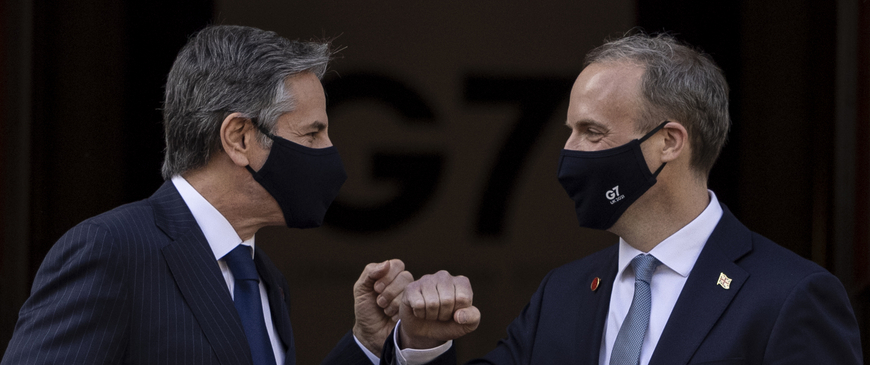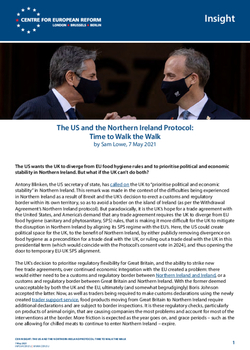
The US and the Northern Ireland Protocol: Time to walk the walk
The US wants the UK to diverge from EU food hygiene rules and to prioritise political and economic stability in Northern Ireland. But what if the UK can’t do both?
Antony Blinken, the US secretary of state, has called on the UK to “prioritise political and economic stability” in Northern Ireland. This remark was made in the context of the difficulties being experienced in Northern Ireland as a result of Brexit and the UK’s decision to erect a customs and regulatory border within its own territory, so as to avoid a border on the island of Ireland (as per the Withdrawal Agreement’s Northern Ireland protocol). But paradoxically, it is the UK’s hope for a trade agreement with the United States, and America’s demand that any trade agreement requires the UK to diverge from EU food hygiene (sanitary and phytosanitary, SPS) rules, that is making it more difficult for the UK to mitigate the disruption in Northern Ireland by aligning its SPS regime with the EU’s. Here, the US could create political space for the UK, to the benefit of Northern Ireland, by either publicly removing divergence on food hygiene as a precondition for a trade deal with the UK, or ruling out a trade deal with the UK in this presidential term (which would coincide with the Protocol’s consent vote in 2024), and thus opening the door to temporary EU-UK SPS alignment.
Antony Blinken has called on the UK to “prioritise political and economic stability” in Northern Ireland. But, it is the UK’s hope for a trade agreement with the United States that is making things more difficult.
The UK’s decision to prioritise regulatory flexibility for Great Britain, and the ability to strike new free trade agreements, over continued economic integration with the EU created a problem: there would either need to be a customs and regulatory border between Northern Ireland and Ireland, or a customs and regulatory border between Great Britain and Northern Ireland. With the former deemed unacceptable by both the UK and the EU, ultimately (and somewhat begrudgingly) Boris Johnson accepted the latter. Now, as well as traders being required to make customs declarations using the newly created trader support service, food products moving from Great Britain to Northern Ireland require additional declarations and are subject to border inspections. It is these regulatory checks, particularly on products of animal origin, that are causing companies the most problems and account for most of the interventions at the border. More friction is expected as the year goes on, and grace periods – such as the one allowing for chilled meats to continue to enter Northern Ireland – expire.
The protocol and its implementation can in part be linked to new economic and political disruption in Northern Ireland – in the form of certain food products being temporarily unavailable in some stores and rioting. Many in the Unionist community have become increasingly hostile to a framework that has seen Northern Ireland remain more closely integrated with the EU (and Ireland) than the rest of the UK in certain respects. The UK has attempted to quell some of these concerns by taking unilateral action to extend grace periods and ensure continued “unfettered” trade between Great Britain and Northern Ireland, but this has created a further trust deficit in its discussions with the EU, making negotiated (and permanent) easements more tricky.
One obvious way forward – suggested both by this author and many others – would be for the UK and EU to negotiate a veterinary agreement, similar to the one the EU has with Switzerland, which would see the removal of all border checks and veterinary declarations for food entering Northern Ireland from Great Britain (and entering the EU in general) in return for the UK binding itself to the EU’s food hygiene rules. This would make it easier and cheaper for supermarkets and other food suppliers to continue bringing meat and other animal products into Northern Ireland, and avoid usual EU restrictions or bans placed on food imports from outside its territory.
The UK has so far opposed a deep veterinary agreement. It would prefer instead an equivalence arrangement similar to the EU’s (and UK’s) with New Zealand, which would reduce but not remove friction, and bespoke solutions that could see fewer controls on food products at no risk of onward transport out of Northern Ireland into the EU. There are several reasons for the British government’s opposition to a solution that would not only ease economic (and potentially political) disruption in Northern Ireland but also be welcomed by food exporters across the UK. A Swiss-style veterinary agreement would require the UK to adopt EU SPS rules both now and in the future – something the UK has been keen to avoid as a matter of principle. It would also require Lord Frost, the UK’s former Brexit negotiator, now in charge of ongoing discussions with the EU, to acknowledge that the deal he struck, and the emphasis he put on regulatory autonomy at all costs, is suboptimal, and in need of improvement. And admitting you were wrong is never easy.
But in extending the grace periods unilaterally, Frost has already acknowledged that Northern Ireland is not prepared for the challenges created by his Brexit deal. And few in the UK would begrudge a pragmatic solution that not only benefitted Northern Ireland, but also the UK’s food, fishing and agriculture sectors in general.
In extending the grace periods unilaterally, Frost has already acknowledged that Northern Ireland is not prepared for the challenges created by his Brexit deal.
However, the UK is also unwilling to align with the EU on SPS rules because doing so would tie its hands when negotiating new trade deals. And a Swiss-style veterinary agreement would require the UK to apply the same SPS rules to imported foods as the EU (with the caveat that Switzerland has a carve-out allowing it to import labelled hormone treated beef, so as to avoid breaching its WTO obligations), potentially reducing the UK’s ability to accommodate the demands of trade partners. But the UK’s inability to alter its food hygiene rules only jeopardises its negotiations with one potential partner: the United States. Trade deals with Australia, New Zealand and accession to the Comprehensive and Progressive Agreement for Trans-Pacific Partnership (CPTPP), all UK priorities, would not be affected because food standards are not a deal breaker for Australia, New Zealand or the CPTPP membership. (Although in the case of CPTPP the UK might want to seek formal clarification on whether UK food safety rules are fully compatible with its CPTPP obligations in the event the US ever re-joins.)
The US has long opposed the EU’s approach to SPS, and its bans on hormone usage and restrictions on the chemical washing of animal carcasses in particular, which has led to American beef, poultry and pork products being for the most part excluded from the European market. The removal of these restrictions is a key priority for the US and its exporters in any negotiations with the UK, which is viewed as a stalking horse for the EU as a whole and a means of gaining a regulatory foothold in the wider-Europe region. From an economic perspective, this is understandable, but it also conflicts with the Biden administration’s expressed desire for “political and economic stability” in Northern Ireland.
This is because it plays a part in reducing the British government’s political room for manoeuvre – with many Conservative party MPs and members still viewing a trade deal with the US as an ultimate prize of Brexit.
Here, the US could clarify that it will still seek a trade agreement with the UK, even if the UK retains and remains bound to EU food hygiene rules. However, to do so would be to concede the argument, and accept that the EU approach to SPS is here to stay, risking the wrath of the US’s large agri-food lobby. The US might also argue that if both the EU and UK dropped their restrictions on US food processing methods, then the EU and UK could strike a veterinary agreement without there being any constraint on either’s ability to do a trade deal with the US. But given the EU’s experience of past EU-US trade negotiations, and the extreme public backlash the US’s demands provoked, this too is unlikely.
Instead, the US could publicly acknowledge an open secret: a comprehensive free trade agreement with the UK is not a priority in this presidential term. The US could then, more quietly, encourage the UK to enter into a veterinary agreement with the EU on a temporary basis, to be revisited as and when UK negotiations with the US begin in earnest. Doing so could potentially help create some wriggle room for the British government, and reduce economic and political instability in Northern Ireland, by drastically reducing the friction experienced by companies bringing food into Northern Ireland from Great Britain. From a US perspective, it would also help settle tensions between two of its closest allies, and ease co-operation on other important issues.
The US could publicly acknowledge an open secret: a comprehensive free trade agreement with the UK is not a priority in this presidential term.
Of course, food is not the whole story in Northern Ireland; the EU will also need to show flexibility on issues such as the status of medicines being sold in Northern Ireland from the beginning of 2022, and Northern Ireland’s ability to benefit from UK tariff-rate quotas, among other things (as I have previously argued: it takes two to tango). And technical fixes might not ever be enough to resolve tensions centred on identity and sense of being, but bringing the SPS rules of Great Britain back into alignment with those of Northern Ireland would make life a lot easier for many.
Sam Lowe is a senior reserach fellow at the Centre for European Reform.


Add new comment